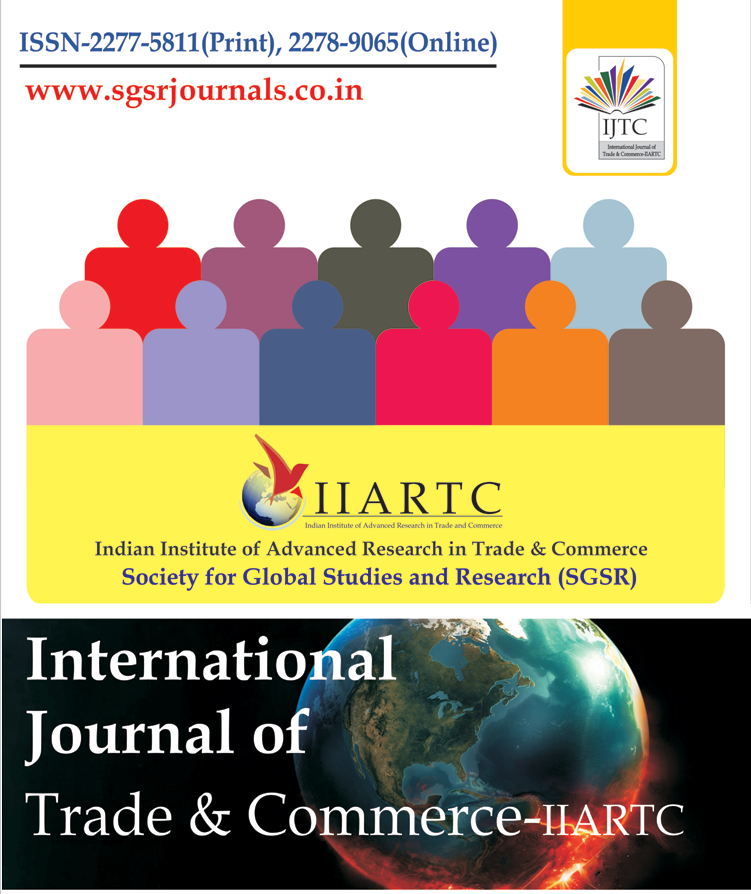Home ⇨ International Journal of Trade & Commerce-IIARTC

International Journal of Trade & Commerce-IIARTC
Impact Factor (IF):5.135 (COSMOS), IF:7.249 (ISRA), IF:3.721 (ISI)
ISSN:2277-5811 (P), ISSN:2278-9065 (O)
Frequency: Half Yearly
Carbon Outsourcing: A Big Hurdle in Reducing CO2 Emissions
Over the last decade, the United States and many European Union countries like UK, France, and Germany, and some rich Asian countries like Japan and Singapore have reduced their CO2 emissions to a great extent, on the contrary, their consumption of goods that produce large amounts of CO2, (also known as consumption-based emissions) although lower, when compared to the last decade, is still higher than their production of such goods (also known as production-based emissions). Now, this is an interesting paradox that how come they are producing less, but still consuming more CO2. To get the complete picture, we have to consider another paradox that is closely related to the first one. If we look at the developing countries like China and India, both, their consumption-based and production-based emissions have grown over this period, however, their production-based emissions grew at a much higher pace than their consumption-based emissions. Now one might wonder why are these countries producing more than they consume, and are the two paradoxes somehow related to each other? The answer is 'Yes', they are related very closely. The reduction in emissions of developed countries is directly related to the increase in the emission of developing countries, as the developed countries have outsourced big quantity of their emissions to developing countries by importing goods from them rather than producing them domestically. This phenomenon of carbon-outsourcing has the caliber of reversing a good deal of progress made in fighting climate change and thus it is crucial to be addressed and tackled properly. In this paper, I discuss in detail the concept of Carbon Outsourcing, its negative impact on the environment and how rich countries exploit this to decrease their overall carbon-footprint.
Author:Vaishali Jaiswala*, Kartik Chaudharyb
Abstract:Over the last decade, the United States and many European Union countries like UK, France, and Germany, and some rich Asian countries like Japan and Singapore have reduced their CO2 emissions to a great extent, on the contrary, their consumption of goods that produce large amounts of CO2, (also known as consumption-based emissions) although lower, when compared to the last decade, is still higher than their production of such goods (also known as production-based emissions). Now, this is an interesting paradox that how come they are producing less, but still consuming more CO2. To get the complete picture, we have to consider another paradox that is closely related to the first one. If we look at the developing countries like China and India, both, their consumption-based and production-based emissions have grown over this period, however, their production-based emissions grew at a much higher pace than their consumption-based emissions. Now one might wonder why are these countries producing more than they consume, and are the two paradoxes somehow related to each other? The answer is 'Yes', they are related very closely. The reduction in emissions of developed countries is directly related to the increase in the emission of developing countries, as the developed countries have outsourced big quantity of their emissions to developing countries by importing goods from them rather than producing them domestically. This phenomenon of carbon-outsourcing has the caliber of reversing a good deal of progress made in fighting climate change and thus it is crucial to be addressed and tackled properly. In this paper, I discuss in detail the concept of Carbon Outsourcing, its negative impact on the environment and how rich countries exploit this to decrease their overall carbon-footprint.




